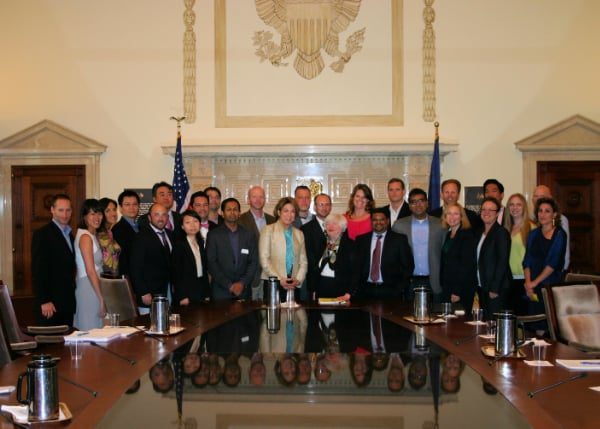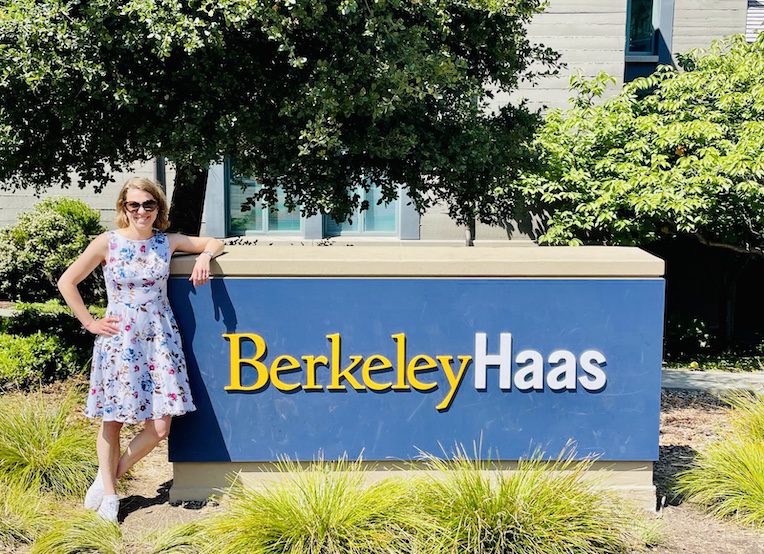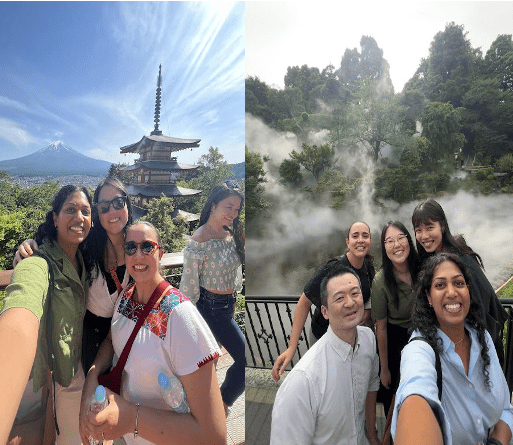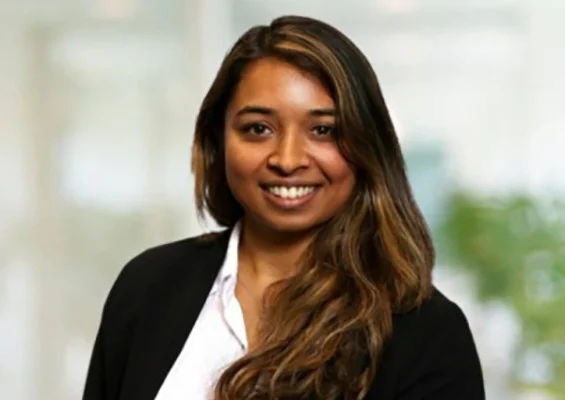EMBA Immersions: Unrivaled Access, Unanticipated Growth
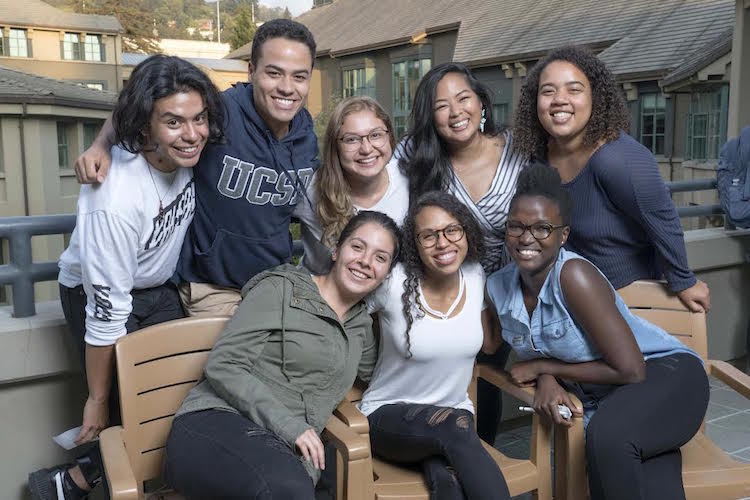
Top (L to R): David Aguilar, BS 19, David Webb, BS 20, Claudia Diaz BS 19, Asst. Admissions Director Mary Balingit, and Mia Character, BS 20. Bottom (L to R): Maria Ortega, BS 19, Frances James, BS 20, Habiiba Malingha, BS 20. All photos: Jim Block
Berkeley freshmen Priscilla Mendoza and Sophie Getahoun attended last week’s RISE kickoff meeting questioning whether they would belong in the Haas undergraduate program.
“As a freshman, I came in thinking I wanted to get into Haas, but didn’t know much about it,” Mendoza said. “As a woman, as a person of color, I didn’t see a lot of people who looked like me.”
But by the end of the monthly meeting of RISE (Reach, Inclusion, Service, Equity), an admissions outreach program created to boost the Haas undergraduate applicant pool of historically underrepresented minorities (URMs), both women had a change of heart about Haas.
They said they were inspired by the meeting’s speakers—a variety of local business and community leaders from different racial backgrounds who told stories of how they overcame failure. They also met and mingled with other students who looked like them, a mix of 30 UC students interested in applying to Haas, alongside Haas juniors and seniors.
“After today, I know that business is what I want to do,” Getahoun said. “Just being in this building is amazing. This motivates us as freshman to work hard.”
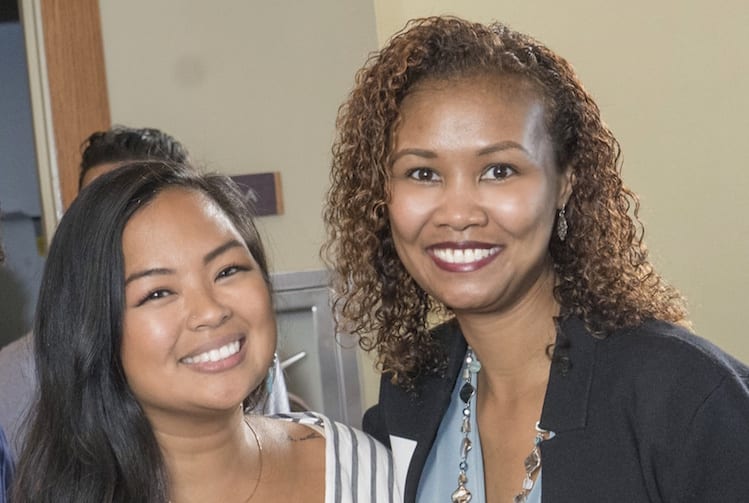
Mary Balingit and Erika Walker of the Haas Undergraduate Program at the RISE kickoff event.
There couldn’t be a more perfect outcome for Mary Balingit, assistant director of admissions and outreach for the Haas Undergraduate program, who manages RISE’s programming. The program—formerly called Freshman 2 Alumni (F2A)—was founded five years ago to reach out to URMs, or African American, Hispanic American, and Native American students.
“This outreach initiative has gained more traction in the past three years,” said Balingit, who also serves as the undergraduate lead for inclusion & diversity. “But we wanted to make it more known, as it’s important to the overall value we place on inclusion and diversity.”
Building a coalition
Before the night’s panel of speakers took the stage, Erika Walker, assistant dean of the Haas Undergraduate Program, urged the students to form small, supportive communities, advice she said she took when she first arrived in 1992 as a first-gen student at UC Berkeley.
Since Walker arrived at Haas in 2004, she’s worked to increase the percentage of students applying to Haas from underrepresented minority groups.
“Our goal was to build a coalition so we could reach out to students freshman year to educate them about the school and opportunities, so they could make a decision about whether to apply,” Walker said.
By many counts, Walker and her team are succeeding. In Fall 2004, URMs comprised 4 percent of the UC Berkeley applicant pool and 6 percent of the transfer student applicant pool. The total entering class was 4.6%.
In 2018, URMs comprised 12.4 percent of the UC Berkeley applicant pool and 20.65 percent of the transfer applicants. The class of 359 includes 52 URM students, representing 14.5 percent of the class.
Yet there’s a reason why failure was the theme of the RISE kickoff event: some students said they were fearful about applying to Haas—and fearful of failure overall.
Surrender to the squiggle
Jennifer R. Cohen, a local equity and inclusion leader who created the RISE speaker format based on her experiences as a woman of color, told the students to expect to fail, and grow from it.
“There’s growth in that process (of failure),” she said. “You are going to develop, learn, and think differently because of that adversity.” Cohen encouraged students to “surrender to the squiggle of life—that nonlinear path between where you are today and where you want to be.”
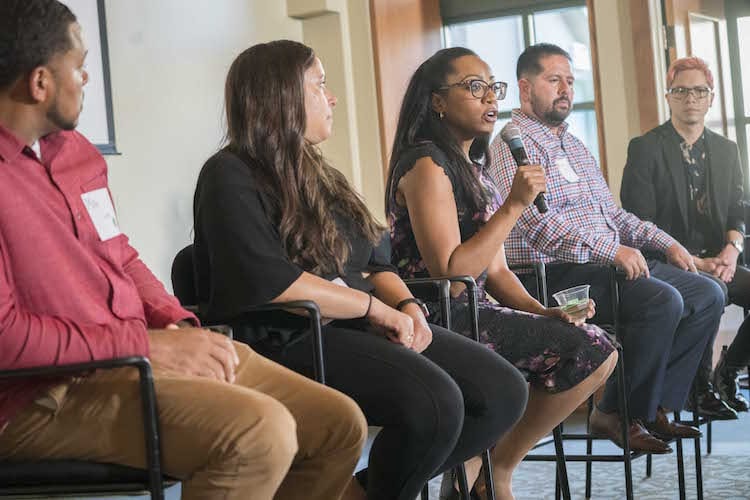
RISE panel speakers discussed failure: L to R: Michael Lee, Ashley Carrick, Malia Cohen, Oscar Olivas, and Michael Austin Sui.
The event speakers then shared their own stories of bouncing back from failure, including:
- Ashley Carrick, BS 10, who works in strategic planning at Google, who recalled trying unsuccessfully to get elected to the Latino Business Student Association (LBSA) as a freshman at UC Berkeley, and going home to her dorm in tears after giving nine (unsuccessful) speeches. When she returned to the organization the next day, they offered her a job as the group’s IT operator. She remains involved with the organization today.
- Oscar Olivas, BS 05, a credit analyst at Wells Capital Management, said he overcame a challenging youth and even an arrest while growing up in L.A., to land a job at Wells, where he’s worked for over a decade. He advised students to join three organizations with three missions: one that connects you to your university, one that helps with your career, and one that connects you to your culture. “If you do those things you’ll be balanced,” he said.
- Malia Cohen, president of the San Francisco Board of Supervisors (District 10), shared a story of getting cut three times at tryouts for the prestigious drill team at Lowell High School, but bouncing back to get elected student body president.
Asked by a student about how she handled “imposter syndrome”—a fear of being exposed as an unqualified fraud—Cohen said “I reject it. I don’t own that.” Cohen said she’d rather spend time “changing the environment that I am part of, getting more women elected, raising money, and opening doors.”
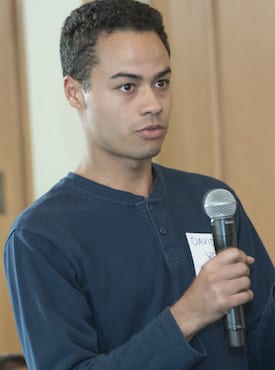
Haas junior David Webb
Habiiba Malingha, a Haas junior from Uganda who is part of the RISE steering committee, said she found Malia Cohen’s talk inspiring. “People underestimate you right away because of your skin color,” said Malingha, who as a child decided she wanted to become a doctor but was encouraged by her father to study business—and create hospitals for people. “If I am in a space where people aren’t taking me seriously because of how I speak and who I am, I need to address it. Some people may not want to work with you because they assume things about you. There are people that you may need to educate.”
David Webb, a junior at Haas who also studies city planning, said RISE has helped him to overcome his own imposter syndrome over the past year.
“I totally feel like I belong here now,” he said. “A lot of classmates I talk to the most are in RISE, and they’re so, so helpful. That’s helped me to integrate into the classes. It’s awesome here.”
Posted in:
Topics:
